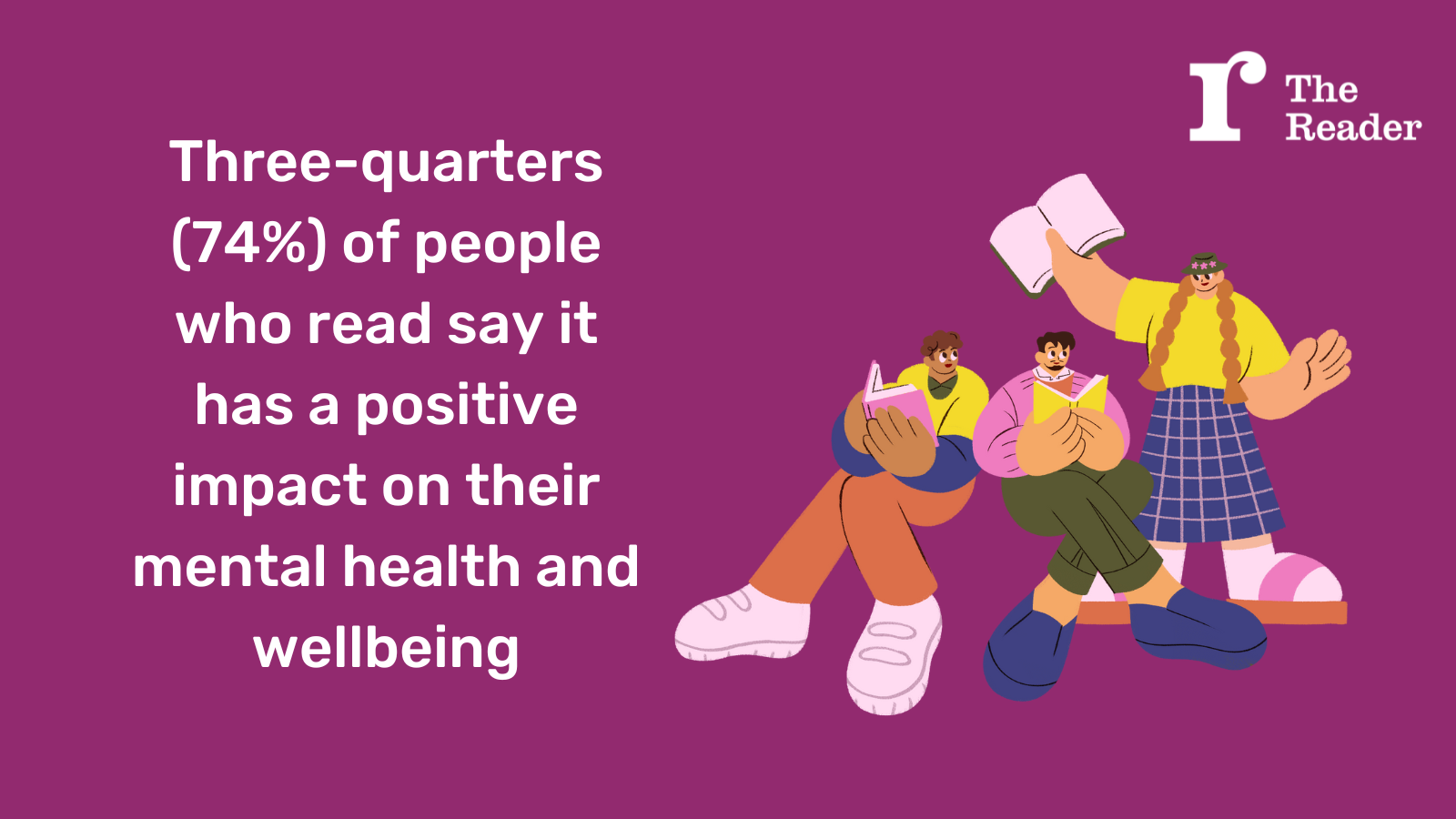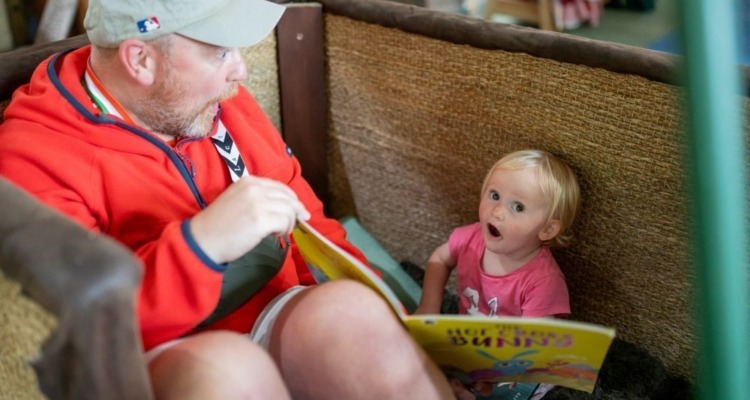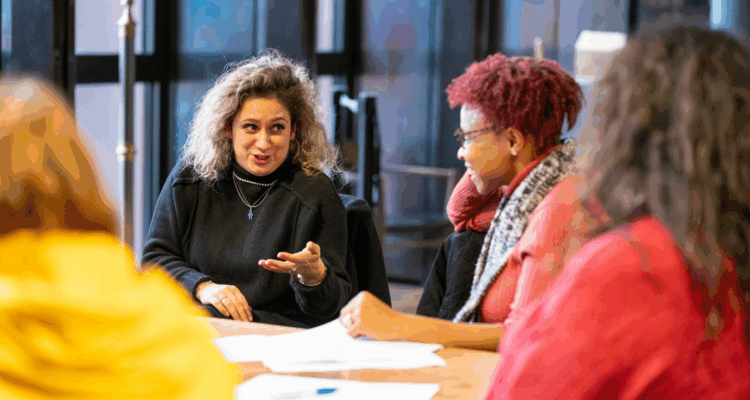New research reveals the power of reading and wellbeing
As part of our mission to bring about a reading revolution, we’ve conducted new research into the mental health impact of ‘a good book’ and the power of Shared Reading groups in providing community mental health support.

As part of our mission to bring about a reading revolution, we’ve conducted new research into the mental health impact of ‘a good book’ and the power of Shared Reading groups in providing community mental health support.
- Three-quarters (74%) of people surveyed say reading has a positive impact on their mental health and wellbeing.
- Over 40% say reading makes them feel connected to others (41%) and made them feel less alone during lockdown (42%).
- Over two-thirds say they enjoyed being read to as a child (65%).
For younger adults aged 18-34, who are likely to be among those most affected by the current cost of living crisis, reading has even greater significance:
- 59% say reading makes them feel connected to others.
- 56% say reading made them feel less alone during the pandemic.
- 44% say they wish they had someone to read with.
Around three-quarters (74%) of people across the UK who read regularly say it has a positive impact on their mental health and wellbeing, and over three-quarters (77%) say reading makes them feel relaxed and happy.
Reading has a greater impact for younger adults aged 18-34; 59% say reading makes them feel connected to others and 56% say reading made them feel less alone during the pandemic.
Dedicated storytime isn't just for children - adults need it too
For the last twenty years, our work has supported communities through tough times by bringing people together on a weekly basis to talk and share great stories and poems.
The groups enhance the power of reading as a tool for wellbeing by providing a warm and supportive space where people can connect with each other and – by reading texts aloud with each other – get a different perspective on dealing with life’s challenges.
Katie Clark, The Reader’s Director of Literature, said: “Our Shared Reading groups offer what this latest research tells us many people are in need of right now. They’re free and open to anyone – whether they’re struggling or not – who wants to explore their thoughts and feelings with others, and open up about anything that might be affecting their wellbeing. They’re a lifeline for people in tough times.
“At a time when so many of us, especially many younger people, those experiencing mental health difficulties or poverty, are facing growing pressures, we’re calling for more Shared Reading groups in more communities and services all over the UK.”
Helen Cook, 43, from Liverpool, had to give up work after suffering from chronic pain caused by a tumour in her pelvic bone. She’s been attending a shared reading group for ten years. She says: “Something magical happens in a shared reading group. It has been a constant in my life for ten years, supporting me through difficult times and my chronic pain. Hearing others read aloud and taking time to pause and reflect is a therapeutic experience.”
“When we read together, we end up sharing things with each other that we just wouldn’t share with other people. Not because you’re intentionally hiding it, but because it just doesn’t come up when chatting to a friend over a coffee. Observations and realisations come about through the process of shared reading.”
“Reading texts together for the first time and listening to others in a space that is accepting creates an intimacy from finding the human truth in literature. I have often left shared reading group sessions feeling peaceful, lighter and happier. We are like a family unit.”
“We recently read extracts from Half of a Yellow Sun, by Chimamanda Ngozi Adichie, about the Nigerian Civil War, and it helped us process the current war in Ukraine, with the renewed understanding that conflict continues to be part of people’s lives and we as humans have to live with empathy and understanding to confront what’s happening.”
“I would advise any human being no matter what their circumstances, even if you don’t like talking or struggle to read, to attend a shared reading group. You will experience something amazing. Literature helps us find a way forward. It creates enjoyment and human connection.”
Waldo Roeg, a Peer Recovery Trainer at Central North West London NHS Foundation Trust (CNWL) Recovery College said: “Shared Reading is something that’s become very important to me. I first found out about it about ten years ago when we started to run groups at the Recovery College and used it as part of people’s recovery.
“It is fascinating to see the connections that take place through Shared Reading and it also helps me deal with my poor mental health and improves my wellbeing.”
The Reader Bookshelf ‘Top 12’ reading list acknowledges ‘Light and darkness’ since pandemic
Astonishingly, the average UK reader gets through 13 books a year, with just over a third of those questioned (36%) managing 1-5 books a year.
The Reader Bookshelf is our annual recommended list of fiction, plays, non-fictional prose, anthologies, poems and short stories that play an important role in our Shared Reading groups.
We’ve chosen the titles below to fit with this year’s Bookshelf theme of ‘Light and Darkness’:
- Paradise Lost, John Milton (Epic Poem)
- The Other Side of You, Salley Vickers (Fiction)
- Julius Caesar, Shakespeare (Play)
- Wuthering Heights, Emily Bronte (Fiction)
- Through the Corridors of Light, ed. John Denny (Poetry Anthology)
- Sir Gawain and the Green Knight (Ancient)
- Half of a Yellow Sun, Chimamanda Ngozi Adichie (Fiction)
- Gitanjali, Rabindranath Tagore (Poetry Collection)
- Wintering: The Power of Rest and Retreat in Difficult Times, Katherine May (Non-Fiction)
- Collected Stories, Anton Chekhov (Short Stories)
- The Third Life of Grange Copeland, Alice Walker (Fiction)
- Red Dust Road, Jackie Kay (Non-fiction)
To find an online or in person Shared Reading group, visit our Find a Group page.
For all press and media enquiries please contact katiedaviespr[at]gmail.com
Share
Related Articles

We cannot just tell parents to read more. To truly improve children’s futures through reading, we need to properly support the adults around them to do so.
Responding to the Department of Education's announcement that 2026 will be a Year of Reading, The Reader's Managing Director Jemma…

Shared Reading in Wirral Libraries: ‘As a kid people read stories to you but as an adult you lose that – and it’s a fantastic thing to do!’
Two Strategic Librarians for Wirral Libraries, Kathleen McKean and Diane Mitchell have been working in partnership with the UK’s largest…

Pat: ‘You don’t need to be an academic – it’s about going on your gut feeling about a story or poem’
National charity The Reader runs two popular weekly 90-minute Shared Reading group at one of the UK’s most innovative libraries,…


